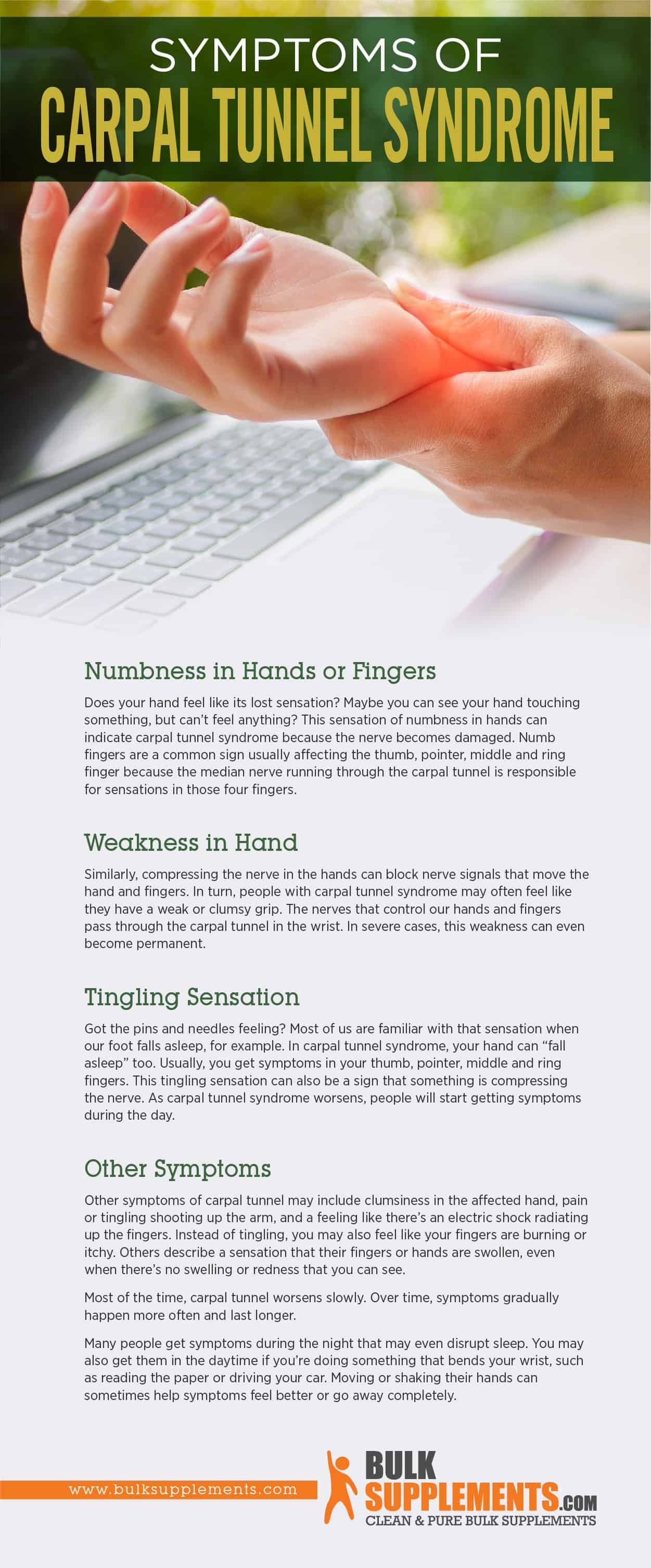Carpal Tunnel Syndrome: Symptoms, Causes & Treatment
by James Denlinger Digital Marketing StrategistWhat is Carpal Tunnel Syndrome?
Writing or typing for long periods can cause a cramp in your hands. Some people may even experience numbness in their hands and fingers. If these sensations plague you, then you may have carpal tunnel syndrome. Carpal tunnel syndrome occurs when a nerve in your wrist becomes “pinched”. Many factors can cause this to happen. It’s especially common in jobs like assembly-line work, including sewing and cleaning.
Some people with carpal tunnel syndrome resort to surgery, but one doesn’t necessarily require surgery to get better. There are some at-home exercises you could try, as well as alternative remedies that may help. The first step to healing is to recognize the signs and seek further advice from a doctor. Some medical conditions can make your carpal tunnel worse, so managing any underlying illnesses is essential for improving.
Carpal Tunnel Syndrome Symptoms
If you have carpal tunnel syndrome, you may experience any or all of the following symptoms:
Numbness in Hands or Fingers
Does your hand feel like its lost sensation? Maybe you can see your hand touching something, but can’t feel anything? This sensation of numbness in hands can indicate carpal tunnel syndrome because the nerve becomes damaged. Numb fingers are a common sign usually affecting the thumb, pointer, middle and ring finger because the median nerve running through the carpal tunnel is responsible for sensations in those four fingers.
Weakness in Hand
Similarly, compressing the nerve in the hands can block nerve signals that move the hand and fingers. In turn, people with carpal tunnel syndrome may often feel like they have a weak or clumsy grip. The nerves that control our hands and fingers pass through the carpal tunnel in the wrist. In severe cases, this weakness can even become permanent.
Tingling Sensation
Got the pins and needles feeling? Most of us are familiar with that sensation when our foot falls asleep, for example. In carpal tunnel syndrome, your hand can “fall asleep” too. Usually, you get symptoms in your thumb, pointer, middle and ring fingers. This tingling sensation can also be a sign that something is compressing the nerve. As carpal tunnel syndrome worsens, people will start getting symptoms during the day.
Other Symptoms
Other symptoms of carpal tunnel may include clumsiness in the affected hand, pain or tingling shooting up the arm, and a feeling like there’s an electric shock radiating up the fingers. Instead of tingling, you may also feel like your fingers are burning or itchy. Others describe a sensation that their fingers or hands are swollen, even when there’s no swelling or redness that you can see.
Most of the time, carpal tunnel worsens slowly. Over time, symptoms gradually happen more often and last longer.
Many people get symptoms during the night that may even disrupt sleep. You may also get them in the daytime if you’re doing something that bends your wrist, such as reading the paper or driving your car. Moving or shaking your hands can sometimes help symptoms feel better or go away completely.
 PIN IT
PIN ITCauses of Carpal Tunnel
Workplace Factors
Certain jobs place one at higher risk of developing carpal tunnel. One Washington study found a higher prevalence of carpal tunnel syndrome in workers with jobs requiring hand strength, repetitive movements and hand vibration. Another multi-center study that included production and service workers also found a link between carpal tunnel syndrome and higher levels of forceful hand use on the job.
Most jobs associated with carpal tunnel involve repetitive hand motions or awkward hand positioning. These include knitting, sewing and people like cashiers or those who work in assembly-line industry jobs. Other tasks in the workplace that may strain your wrist include jobs that require you to hold a vibrating drill with a firm grip, putting stress on your palm and wrist. Tasks like milking cows, using spray paint and hand welding also require extensive hand strength and awkward wrist positioning. Regularly typing on a computer may also cause carpal tunnel.
Excessive Pressure on the Median Nerve
In carpal tunnel syndrome, the space in your wrist where your nerve and tendons travel narrows. The limited space compresses and damages the nerve in the carpal tunnel, which is the median nerve. Also, several tendons that reside in this tunnel are responsible for bending one’s fingers and thumb. The median nerve has fibers for motor and sensation in your hand and fingers, especially the thumb, pointer finger, middle finger and half of the ring finger. That’s why you exhibit symptoms in these fingers most often when you have carpal tunnel syndrome. The median nerve also serves the palm of your hand, as well as the muscles that control your thumb.
Why might this space get smaller? This small space can become crowded if there is swelling. Both medical conditions and repetitive movements can cause swelling; and when that happens, the tissues surrounding the carpal tunnel take up more space. Trauma, arthritis, hormonal changes and autoimmune diseases can affect the wrist and cause swelling. Other causes of high pressure in the wrist include cysts, tumors, obesity and fluid retention during menopause or pregnancy. At the end of the day, there are many different reasons why you may ultimately develop carpal tunnel.
Carpal Tunnel Syndrome Remedies and Supplements
Vitamin B6
Since the 1970s, vitamin B6 has been a natural remedy for carpal tunnel syndrome. Also known as pyridoxine, vitamin B6 can help with nerve health and function because it is involved with the metabolism of proteins and neurotransmitters in neurons. However, later research yielded conflicting results. Specifically, one study of 40 patients found that a three-month treatment of 120 mg vitamin B6 per day helped relieve carpal tunnel symptoms. Improvements included the number of time pain disrupted their sleep, level of hand numbness and weakness and severity of numbness and tingling.
Currently, there isn’t enough evidence to recommend vitamin B6 for treating carpal tunnel syndrome. But because it doesn’t have any side effects, it doesn’t hurt to try. Some doctors recommend it as a supplement to other treatments. One study suggested a combination of non-steroidal anti-inflammatory drugs (such as ibuprofen), using a splint at night, careful review for risk factors at work and supplementing with vitamin B6.
In addition to a healthy nervous system, vitamin B6 also boosts mood and promotes healthy sleep. The Food and Drug Administration recommends a daily dose of vitamin B6 is 2 mg or less daily. However, most doctors recommend supplementing with higher doses for carpal tunnel. It’s better to be on the safe side and not exceed more than 125 mg per day, although scientists report the first signs of observed side effects appear with 500 mg per day dosing.
Common side effects include nerve pain or dysfunction. Some doctors may advise supplementing vitamin B6 in attempts to avoid carpal tunnel surgery. As always, consult with your doctor first before trying any alternative therapy.
Vitamin B12
Vitamin B12 is a naturally available nutrient that is found in meat. One Japanese review reports that high doses of vitamin B12 may help with nerve problems including carpal tunnel, but the evidence is limited. When used in combination with other supplements, vitamin B12 was found to reduce pain and improve nerve sensation testing in carpal tunnel syndrome.
On the other hand, a different study found that a combination of B12 with other B vitamins failed to help those with moderate to severe carpal tunnel symptoms. Scientists theorize that the activated form of vitamin B12, methylcobalamin, helps with maintaining a healthy nervous system. Several laboratory studies have found that it is required for genetic processes, the growth of nerves, and blocks neuron death on a molecular level.
Despite the conflicting evidence, vitamin B12 is a relatively safe and common supplement to take. Also known as cobalamins, this nutrient helps your body make DNA, hormones, proteins and red blood cells. It also supports the health of your brain and nerves. You can find this nutrient in foods like eggs, dairy, cereals, seafood and meat.
The FDA recommends a daily intake of 7 micrograms. You may find this dietary supplement in various forms of B12, including cyanocobalamin or methylcobalamin. Though any excess B12 gets passed in the urine, this popular supplement could become toxic if you take overwhelming amounts. Some symptoms you can get from high doses of B12 include dizziness, anxiety, nausea and vomiting. Never exceed your daily dose or the dose advised by your doctor. Vitamin B12 can also interfere with medications, including antibiotics, heartburn medications and diabetic medications.
Rest
Besides dietary supplements, giving your wrist a good break may do the trick. Take some time from work or wear a splint when you have to use your wrist. You can try hanging your hand off your bed in the night to prevent any awkward positions that can make things worse during sleep. Try icing your wrist in an ice bath for 10 minutes to decrease any active swelling. On the flip side, warm water soaks may also help loosen up tendons and muscles for pain relief.
Exercises
There are several exercises you can try at home to possibly relieve symptoms or prevent carpal tunnel syndrome. One meat company in Oklahoma found these exercises to be so helpful that they implemented a program for all their workers.
Carpal tunnel syndrome exercises involve stretches that relieve pressure on the median nerve. You can try these simple steps from the American Academy of Orthopedic Surgeons. They recommend a 3-4 week regimen of daily wrist stretches and medial nerve glides. The stretches and nerve glides don’t take any more than a few minutes to do. That’s a small price to pay for some carpal tunnel syndrome prevention! If you don’t want to use a proper exercise regimen, you can still benefit from a simple wiggle and stretch of your hand muscles, too.
The Bottom Line
If you have pain or tingling in your hands or fingers, you may be suffering from carpal tunnel syndrome. Carpal tunnel syndrome is a condition where your median nerve gets “pinched.” It can be caused by many different factors that all result in narrowing of the space in your wrist. People who have certain medical conditions or specific types of work are at a higher risk of developing carpal tunnel. Besides surgery, there are alternative and homeopathic remedies that may prevent or relieve symptoms of carpal tunnel. These include vitamins B12 and B6, as well as at-home exercise and rest. Always consult with a physician before trying a new home remedy.
Sponsor Ads
Created on Mar 15th 2020 16:40. Viewed 365 times.





